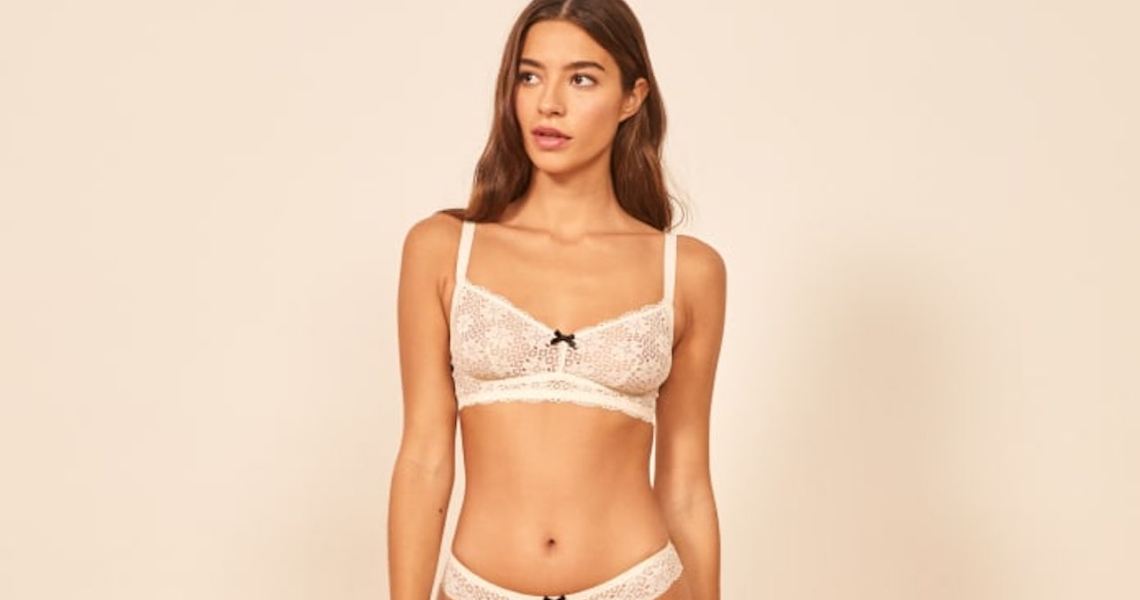Cosabella, an Italian lingerie company, has made its own brand a priority since it launched in 1983. But in recent years, as Victoria’s Secret’s dominance of the market has waned and a big crop of DTC brands have looked to get in on lingerie, private label and collaborations have increasingly become a bigger part of the business.
Brands like Eloquii and Reformation have recently entered the lingerie market while big retailers like Target have focused on private-label intimates, all seeking to fill the void left by Victoria’s Secret, which has seen increasingly declining sales since 2016 and a cultural backlash toward its brand of ultra-sexy marketing. At the same time, these brands are also hoping to grow their own businesses through launching new categories. Bras are a notoriously complicated product to manufacture — there are four-year degrees just for lingerie design at FIT — so these newcomers to the market are turning to companies like Cosabella, which has 40 years of experience and entrenched relationships with manufacturers, or to the manufacturers themselves to help.
“There have been so many DTC brands without a lot of manufacturing expertise that have come into this space recently,” said Silvia Campello, co-CEO of Cosabella with her brother Guido Campello. “But they’ve brought so much attention to the industry and to intimate apparel, in general. They’ve put so much marketing and energy in, and, in many ways, it’s been an advantage for us, too.”
In the past three years alone, Cosabella has done collaborations with Eloquii, Reformation and Banana Republic. With each partnership, Cosabella designed products for a brand that did not have a traditional familiarity with lingerie design and customized each line for the partner’s specific needs. For Eloquii, the pieces had to be sized inclusively, from size small to 5XL. For Reformation, the entire line had to be designed to Reformation’s exacting sustainability standards, and for Banana Republic, the focus was on petite sizing.
The brands Cosabella works with typically want to expand into new categories and grow beyond their initial product focus, said Guido Campello. “People want a store to be a lifestyle store, to have lots of different categories,” he said. “And a lot of these stores don’t have lingerie departments.”
In the past few years, in addition to collaborations, private labels have become a bigger part of Cosabella’s business. Silvia Campello did not disclose for which brands or retailers Cosabella has been making private-label product (or product with no co-branded component) or what the specific monetary terms of any deals are. Typically, private labels are commissioned at a fee and sold by the retailer; the manufacturer does not take a percentage of sales thereafter. Silvia Campello did say that private labels currently make up around 10% of the total business, a significant boost from the percentage a few years ago. She said the brand is selective about what companies it works with and has intentionally limited the extent of its private-label business, despite all the interest.
“We get asked all the time to produce for a lot of newer DTC brands,” Guido Campello said. “We have 37 years of relationships built up with a lot of these family-owned manufacturers and artisans in Italy. The reason it’s difficult to get into this market is because you don’t have those relationships. If [the manufacturers] don’t know you, they won’t take a chance on you. We have those relationships.”
The Campellos attributed the increased interest in their private-label business to the difficulty of breaking into women’s lingerie, from a manufacturing perspective. This sentiment is being echoed throughout the sector.
“With bras, in particular — underwire bras, especially — they’re really hard to make in the U.S.,” said Jane Fisher, co-founder of DTC intimates brand Harper Wilde, which works with MAS Holdings, which is a large manufacturer that makes products for Calvin Klein, Athleta, Gap and H&M. “You’d have to import all these different pieces and assemble them here, which doesn’t make sense. You kind of have to go overseas to these larger manufacturers. If we were doing something easier, we might have gone with a smaller boutique manufacturer, but that’s not doable in this space.”
Due to the difficulty of manufacturing, brands need an experienced manufacturer that can source a diverse array of materials. Michelle Cordeiro Grant, founder of lingerie brand Lively, estimated, from her experience working at Victoria’s Secret, that making a full underwear line, in the standard size range of XS to 3XL or 4XL, would require 25 to 40 different suppliers and could take up to two years to set up.
For a shortcut, some brands are exchanging equity for help from manufacturers, which is how Lively has tackled the lingerie market, while others are turning to brands like Cosabella, which have established relationships with manufacturers.
Guido Campello emphasized that some of these factories have been around for decades and are hesitant to take on new clients. Cosabella, as an existing client, can act as the go-between for brands and manufacturers. For example, Cosabella makes almost all of Banana Republic’s intimate apparel offerings, a process that took 36 months to completely build out, and it has recently expanded to making Banana Republic’s sleepwear, as well. Cosabella is now the No. 1 third-party partner of Banana Republic.
For its own brand, Silvia Campello said the company is shifting toward a DTC model. Despite being sold in over 1,000 wholesale stores around the world, Cosabella has shifted its business to a 35% direct and 65% wholesale model, with most direct sales coming through partnerships with marketplaces. Silvia Campello declined to disclose the company’s annual revenue overall.
“The key to our flexibility is that we are asset-light,” said Silvia Campello, meaning it doesn’t own the factories. “All of these family-owned manufacturers in Italy are not owned by us, but they produce for us exclusively.”




